Guide to Climate-Controlled Storage
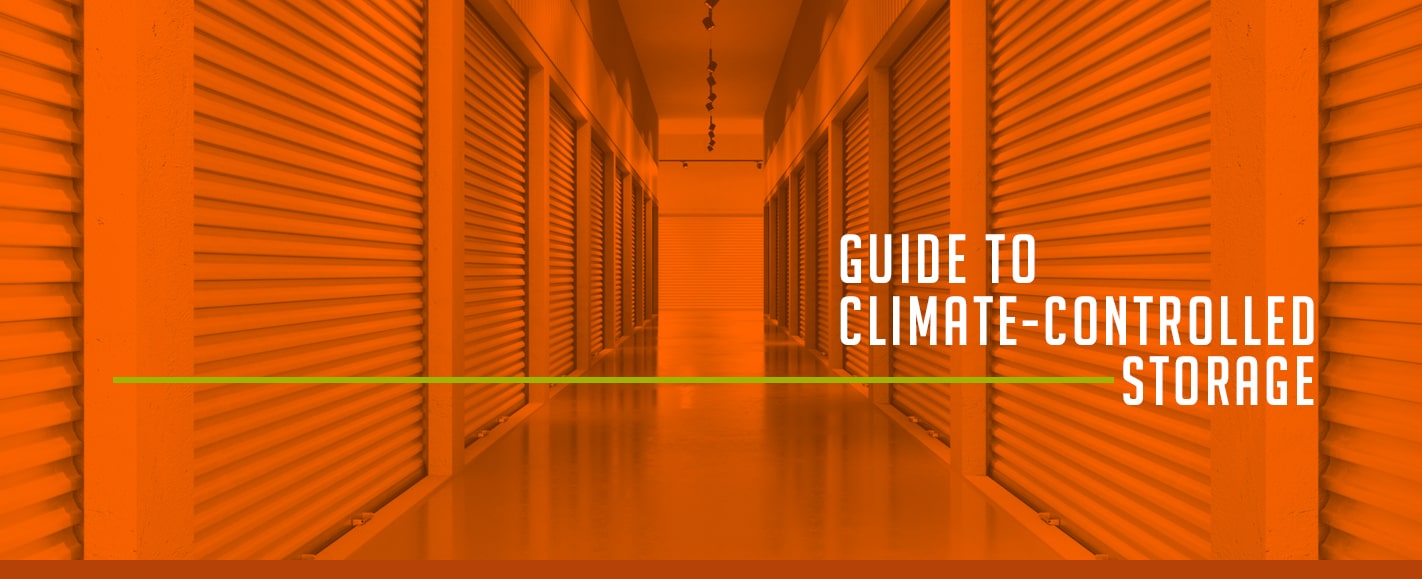
Properly storing your products could make the difference in their viability and shelf life. Climate-controlled storage could be the key to keeping your goods in perfect condition until they reach your customers. Discover more about this particular storage method and what makes it different.
What Is Climate-Controlled Storage?
Climate-controlled storage keeps products at a specific temperature and humidity level to preserve potentially perishable goods. The exact conditions depend on the products stored. For instance, wine and fresh meat require different storage temperatures. Though food products are the first thing most people think of as requiring controlled conditions, other products may also benefit from controlled storage temperatures and humidity levels.
Temperature maintenance preserves perishables such as food and beverages. But other items also need careful temperature regulation to prevent an early breakdown of components.
- Electronics: Electronics have built-in devices to keep the internal parts below a specific temperature during operation, but there is no control when the electronics are not turned on. Because excessive temperatures can damage electrical components, climate-controlled storage is a sensible option for electronics to ensure the goods reach customers without problems.
- Pharmaceuticals: Pharmaceuticals also benefit from climate control. Many drugs have strict temperature ranges for storage to ensure potency. Correctly storing the drugs will protect the patients who eventually take them. Temperature and humidity control help keep both over-the-counter and prescription medicines preserved before they reach their final destinations.
- Food: Food products require climate control. Even shelf goods need controlled temperatures to avoid spoilage. Climate-controlled storage ensures the food tastes its best and does not become dangerous to eat. The federal government enforces food storage conditions, which means not every cold storage facility will accommodate edibles. If you need climate-controlled storage specifically for consumables, look for a warehouse approved for food use.
- Books and essential documents: Paper products can break down in humid weather. Additionally, hot, humid conditions encourage pests such as paper-eating roaches, booklice and silverfish. The University of Florida recommends storing books and papers in a low-humidity environment discourages these pests from entering the area and damaging the materials.
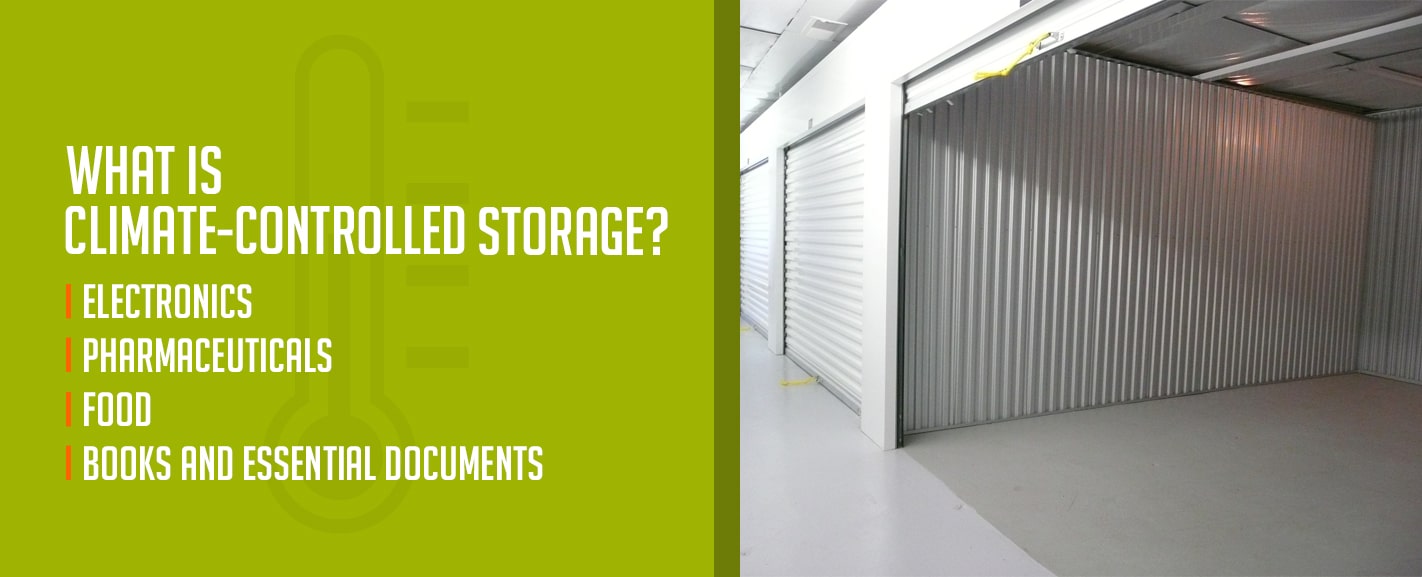
Climate-controlled storage has other uses than for the goods that specifically require it. Understanding the benefits of climate control will help you see why it’s so essential for keeping almost any type of stored items intact in the Central Florida heat and humidity.
Benefits of Climate-Controlled Storage
Climate control regulates temperature and humidity to items last longer. Almost everything from food to medicines specifies storing them in a cool, dry place. Finding such conditions in some parts of the country is difficult in hot, humid Florida. That’s why it’s so critical to locate a facility to suit your needs if you have an inventory of temperature-sensitive goods.
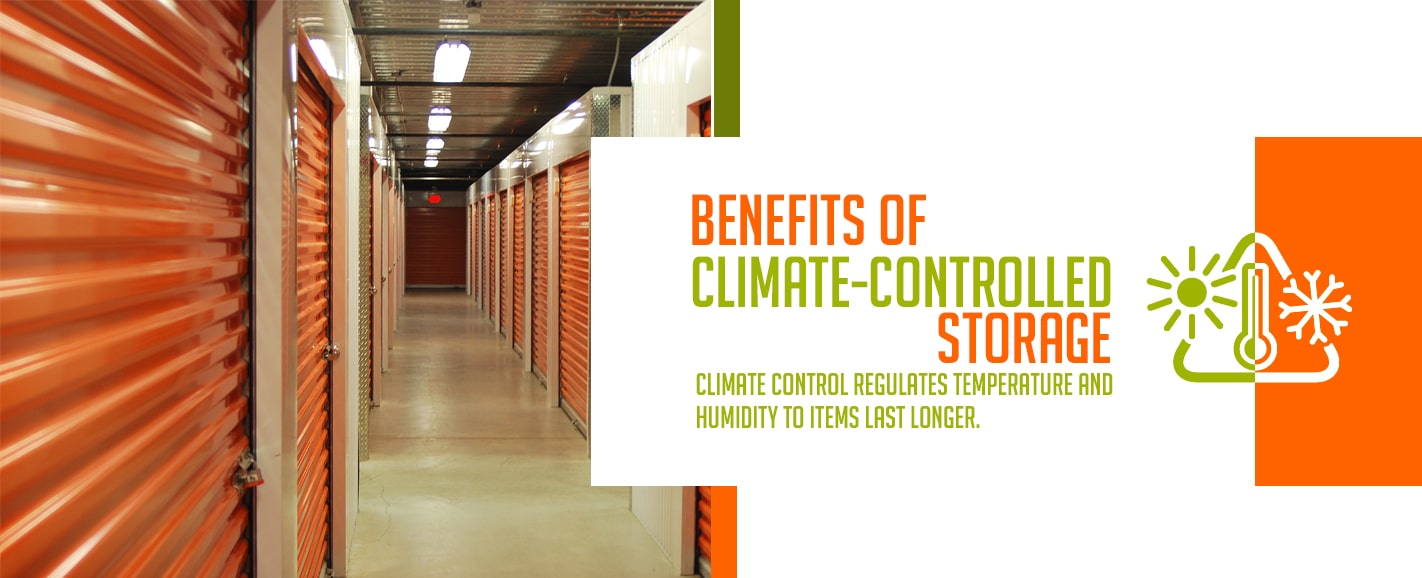
Cold storage is a quickly growing segment of the real estate market, reflecting its increased need across the country. Increasing demand for e-commerce, online grocery shopping, rising populations and a growing consumer spending in healthier foods all drive the need for cold storage, according to real estate analysts with HFF. But these facilities cost a significant amount to construct, especially to reach the strict governmental requirements for food storage. Many companies are seeing the need for climate-controlled space, further driving the demand for such properties. If you need a climate-controlled warehouse, now is the best time to get space while you can find it.
Limited storage space is something many business owners don’t consider. When you have too many products to sell immediately, you need to keep them somewhere secure. But if your company’s warehouses are at capacity, a third-party storage facility can fill in the gaps. Many industries experience seasonal supply fluctuations. For instance, produce harvested during a fruitful year may exceed previous harvests, requiring more storage than anticipated, but only for the season. Flexibility with cold storage is an advantage third-party storage facilities have over the premium storage space of your company’s warehouse.
Warehouses hold a variety of products that store well regardless of temperature, but in warmer climates, even ambient temperatures and humidity may exceed the safe environmental conditions required for leather, wood and paper products. When storing dry goods in hot, humid climates, a climate-controlled warehouse could preserve the products longer than keeping them in a typical storage space.
Climate-controlled storage has applications beyond merely storing products. Remote storage facilities have allowed other companies to expand into new markets by using the storage unit as a distribution center for temperature-sensitive goods. With the help of a third-party logistics provider, you can improve your distribution network without becoming involved in the process yourself. You’ll save time while increasing your delivery range.
Define Climate-Controlled Storage
Climate control means more than just regulating the temperatures. Both temperature and humidity have set ranges the facility maintains. Stable humidity and temperature are the best options for products that may wear out from either excessive moisture or heat. Some goods stored for a short while may survive ambient temperatures, but long-term storage may necessitate stricter environmental controls.
Because climate control has different meanings for storage companies, always ask about the temperature and humidity ranges of the storage. We offer several temperature options. Our freezer storage stays between zero and 10 degrees Fahrenheit. For other climate-controlled areas, we can customize the temperature to what your goods need. Some of our customers have stored fresh seafood, fruits, juices and other products requiring strict temperature control.
Controlling the temperatures can preserve goods for long-term and short-term storage. Whether you genuinely need temperature control for your products, though, will depend on several factors. Knowing your products will help you determine if temperature control is right for your storage needs.
How to Determine Whether You Need Temperature-Controlled Storage
There will be several indications you need temperature-controlled storage for your goods. Some of these are based on the manufacturers’ suggested storage conditions for the products you have. For instance, some manufacturers recommend certain pharmaceuticals to remain at chilled temperatures, whereas others only need cool, dry conditions around 70 degrees Fahrenheit.
Delicate materials that may wear in temperature fluctuations, as are typical in Florida, need temperature maintenance for any storage facility. Furnishings, especially antiques, leather goods, wood products, musical instruments and electronics, all necessitate careful regulation of temperatures to avoid premature wear. While these goods do not require a specific temperature range as food products do, they do need consistent temperatures. The need for a regulated environment means your products require temperature-controlled storage.
Tips When Choosing a Temperature-Controlled Warehouse
When selecting a temperature-controlled warehouse, you want to verify the facility offers the temperatures your goods need. Having the right environmental control is critical when you need to store food products that require freezing temperatures. Inappropriate temperatures or cycles of thawing and refreezing can make the food inedible or potentially hazardous. Verify the warehouse has temperature controls to prevent the products from getting too hot or cold.
If your goods do not require freezer storage, but still need a specific temperature range, see how the warehouse will accommodate your needs. Is there an option for customized temperatures in the warehouse? Or do you only have the choice of a couple of temperature ranges? For instance, wines need slightly warmer temperatures than refrigeration conditions, but still must remain cooler than ambient temperatures. Ask the facility if you can have a specific temperature range for the goods you need to store.
Also, look into warehouse security. How does the facility maintain the safety of personnel at the warehouse and the protection of valuables stored there? While insurance can help recover losses in the event of theft, the disruption of your supply chain can have a more immediate impact. It’s best to choose a warehouse that always does everything possible to prevent theft in the first place by having security on site.
Advantages of Temperature-Controlled Storage
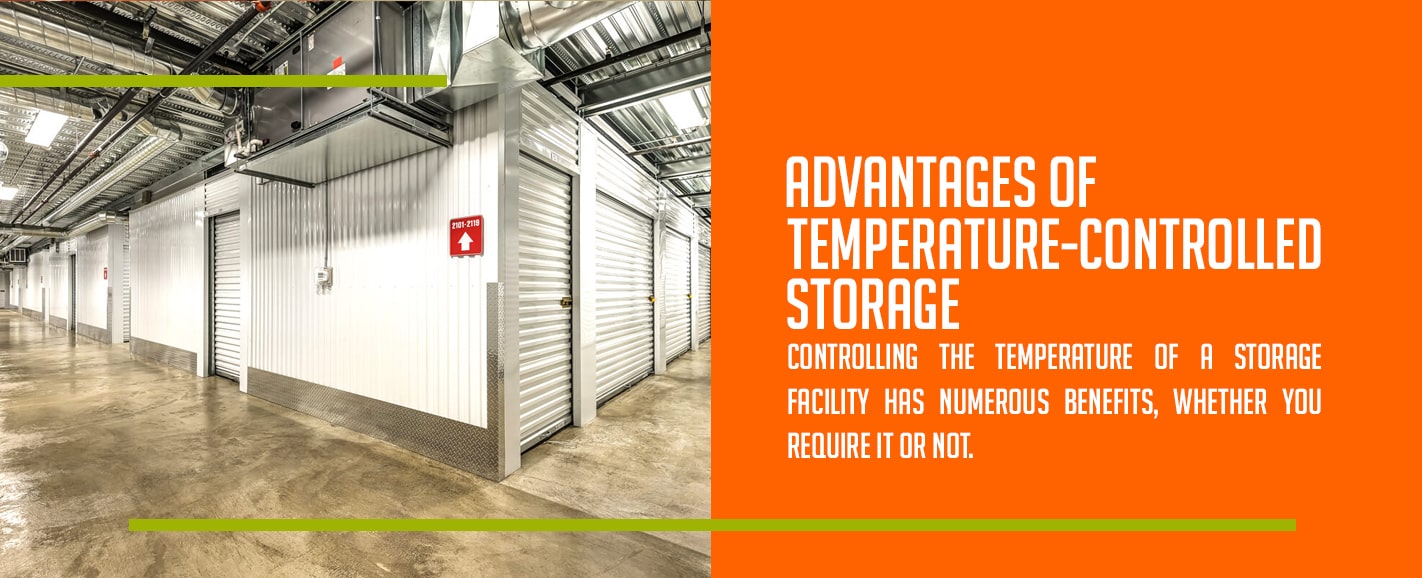
Controlling the temperature of a storage facility has numerous benefits, whether you require it or not. If you must store goods in a hot climate, temperature control in a warehouse can protect your products from the natural heat of summer, which could cause severe damage to even dry goods. Temperature regulation can preserve delicate items such as wood and leather that may expand and crack with wild temperature swings.
Freezer burn occurs when food partially thaws and refreezes. This process negatively affects the quality of the products. If the food becomes too warm for too long, bacteria can take hold, leading to food poisoning or inferior quality. With careful control of the climate in a warehouse that holds frozen goods, the products can reach your customers without a loss of quality or safety.
Understanding the advantages of temperature-controlled storage is one part of improving your warehouse needs. When selecting a facility, you also need to think about how you will use the warehouse and if you require additional logistics services.
Selecting the Best Climate-Controlled Facility
As of October 2017, Florida had more than 211 million cubic feet of cold storage space, making it the second in the country for capacity. Of that number, our newly renovated facility contributes 5 million cubic feet. Once you know you need a climate-controlled facility, look at other factors that could sway your decision. These factors could make the difference in your business operations.
- Security: Does the facility have a secure storage method? At Central Florida Freezer & Warehousing, we have both security staff and videotape monitoring of our facilities 24 hours a day, seven days a week. Keeping your products safe and secure is our priority. Do other facilities offer such security for your inventory?
- Climate monitoring: When you store your goods in a climate-controlled facility, you need to know the facility continually monitors both temperature and humidity. If not, you cannot verify your products will get stored at the appropriate temperatures consistently.
- Backup systems: Power outages can happen at any time. Unless a storage facility has a backup system to ensure the temperatures remain stable, you could lose your entire inventory. Our climate-controlled storage locations have backup generators to maintain the set temperature and humidity, even if winds or storms common in Central Florida knock out the area’s power supply.
- Food-grade storage: If you must store food, the temperature is not the only consideration you will need. Pest control, humidity regulation and other factors play parts in whether a facility will uphold the rigorous rules for food storage. We’ve partnered with several professional food storage groups, including the National Frozen and Refrigerated Foods Association, American Frozen Food Institute and the International Association of Refrigerated Warehouses. These affiliations show our commitment to maintaining a safe atmosphere for food and other consumables that require more stringent storage conditions.
- Inventory control: Maintaining control over your inventory is one of the essential things you can do. We offer both security and environmental monitoring to prevent loss of the products you store with us. Our 3PL, third-party logistics, services are always under evaluation. We strive to improve our logistics services to make ours the best in the state. You can save time, money and stress by turning over your warehouse management to a third-party logistics facility. Of shippers, 75 percent indicated using 3PL has cut their costs. Our services have helped numerous businesses effortlessly expand throughout the state.
- Trucking operations: Getting your products to and from your storage facility without detention is a crucial requirement when finding a warehouse facility for your products. Ideally, you should be able to unload and load the same truck at a facility to save time and avoid the waste of moving empty shipping vehicles. We offer just these cross-docking services with a record of 99.99 percent on-time shipments and almost no detentions.
- Price negotiation: Cost is always a consideration for any aspect of operating a business. Price does not necessarily have to be an obstacle when it comes to offsite storage. The ability of clients to negotiate prices of storage and other 3PL services makes some cold-storage facilities more desirable to do business with than others. We not only offer price quotes for cold storage, but also allow our clients to discuss their needs and budget with us.
- Fulfillment center: You need to get your products to your customers. Depending on your operations, you may need to ship them to a wholesaler or directly to customers. A warehouse with a fulfillment center sends your products to the wholesale dealers who will deliver your goods to the customers. When you select a climate-controlled warehouse with a fulfillment center, you remove another piece of your supply chain from your list of things to worry about. Our fulfillment center is just another component of the many services we offer our clients as a 3PL provider.
Fulfilling Your Storage Needs
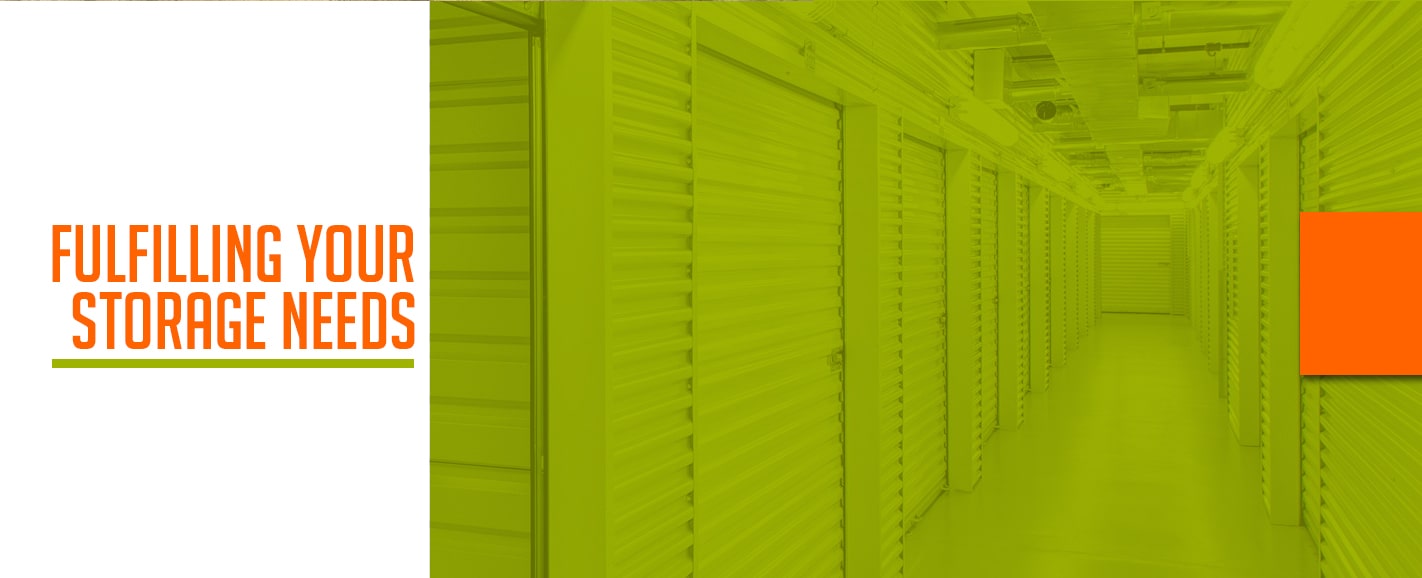
When you need climate-controlled storage, you need a facility that has plenty of space for your products, in addition to other services that make operating your business easier. At Central Florida Freezer & Warehouse, we have 5 million cubic feet of storage, in addition to offering the 3PL services our clients require. Let us help you expand your operations with our on-time deliveries and secure storage. For more information about how you can store your products in our facility, contact us by phone at 352-365-6969 or fill out a price quote request form.

No comments yet.